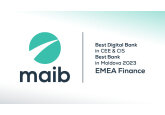
Reverse Factoring from maib - projecting the Debtor's credit rating on the Supplier
In order to offer its clients an efficient method of managing payments, cash flow and working capital, maib has developed a new financing solution available to the bank's corporate clients - Reverse Factoring.
What is Reverse Factoring?
Reverse Factoring is a financing solution for the Supplier but initiated by the Buyer, a bank customer legal entity (the Debtor), used to provide early payments to its Supplier based on invoices from the commercial contract.
Reverse Factoring is based on the assignment of receivables resulting from the delivery of goods or provision of services. For each invoice accepted by the Debtor and maib, the Debtor makes an unconditional and irrevocable commitment to pay maib. At the same time the Supplier, based on the assignment of the receivables and paying a factoring fee to the bank, benefits of an early payment for its invoice (100% of the amount of the invoice).
In Reverse Factoring, the costs are determined by the Debtor's creditworthiness, not the Supplier's, and the Supplier receives 100% of the invoice amount.
An example is worth a thousand words:
Commercial contract. Supplier. Buyer
Suppose we have two companies:
Producer X specialized in the production, processing and preservation of meat and meat products, including sausages and
Supplier Y specialized in livestock farming. It supplies meat to Producer X for production of sausages.
Typically, Supplier Y offers payment terms of up to 30 days for goods delivered. However, Producer X wants payment terms of up to 60 days for effective working capital management. Producer X also wants to ensure a lasting supply chain and to strengthen its relationship with Supplier Y by offering faster payments for its deliveries.
Step 1: Initiating Reverse Factoring
Producer X is a maib corporate client. It is interested in Reverse Factoring through commercial partnerships with its suppliers.
Maib approves a factoring limit for Producer X (the Debtor) and signs the Reverse Factoring contract with the Debtor.
Maib will contact Supplier Y, which Producer X previously accepted. After KYC procedures and signing the factoring contract with the supplier, Reverse Factoring operations can be started.
Step 2: Issuing the invoice
Supplier Y delivers meat to Producer X, issues an invoice for 100,000 MDL and filles with the invoice data the invoice slip.
A copy of the invoice and the invoice slip signed by both parties shall be sent to the bank by Producer X.
Step 3: Payment of the invoice
According to the Reverse Factoring contract signed with Producer X and the factoring contract signed with Supplier Y, maib debits Supplier Y's account with 100 000 MDL upon acceptance of financing of the invoice indicated in the invoice slip. In this way, Supplier Y receives payment quickly, without waiting for the 60-day payment deadline, against a factoring fee paid to the bank (e.g. 2% of the invoice amount or 2 000 MDL).
Step 4: Payment at due date
Producer X will repay the total amount of the invoice 100,000 MDL to maib on due date (in our example, 60 days from the date of issuing the invoice). Thus, Producer X benefits from maintaining liquidity for a longer period, while Supplier Y receives payment immediately, which improves its cash flow and ability to reinvest in the business.
Thus all parties involved can benefit from Reverse Factoring:
- - Supplier Y receives prompt payment, which improves its cash flow, the supplier collects 100% of the invoice value before the due date against a fee paid to the bank. For Supplier Y, Reverse Factoring is an alternative source of finance, which allows access to cash but without impacting its level of indebtedness;
- - Producer X optimizes its cash flow management, strengthens its relationships with suppliers, extends payment terms with the supplier, and ensures the supply chain's continuity.
Maib - we join efforts, we grow business!







